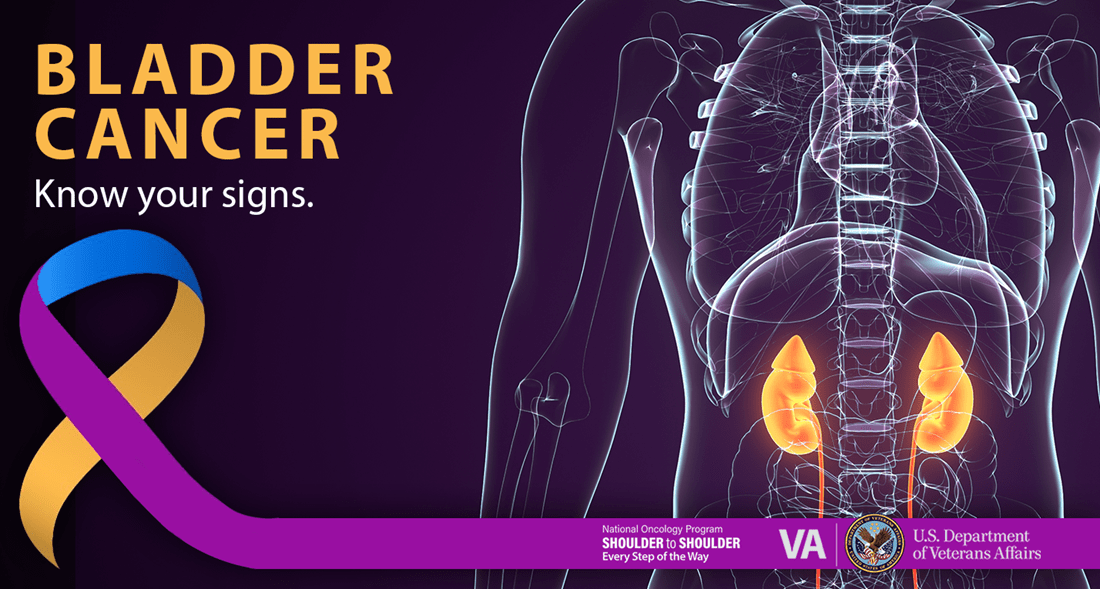Bladder cancer is the 4th most diagnosed cancer in VA.
Approximately 3,200 Veterans are diagnosed with bladder cancer every year. Bladder cancer happens when the cells in the bladder start to grow out of control. Most tumors develop on the inner layer of the bladder. As the cancer grows into deeper layers, it becomes more difficult to treat.
Since early diagnosis is critical to successful treatment and recovery, VA encourages Veterans to talk to their health care provider about the signs and symptoms of bladder cancer.
Signs and symptoms
Signs of bladder cancer can be embarrassing to discuss, but it’s important to talk with your provider as soon as possible if you have any of the following symptoms:
- Blood in the urine; painful or urgent urination; inability to urinate.
- Abdominal pain; lower back pain.
- Fatigue.
- Appetite or weight loss.
Identifying bladder cancer early is important for successful treatment and recovery. Don’t wait to discuss these symptoms with your provider.
Exposure risks for Veterans: Agent Orange, PFAS and Camp LeJeune
Smoking is the most common risk factor for bladder cancer. In addition, some Veterans may be at higher risk of developing bladder cancer than the general population due to their exposure to certain chemicals during their military service.
If you have been exposed to any of the following, be aware that you may be at higher risk of developing this type of cancer:
- Agent Orange, an herbicide used during the Vietnam War to break up vegetation. Bladder cancer is a presumption for Veterans who meet eligibility requirements. To learn more about Agent Orange presumptive conditions, visit Veterans’ Diseases Associated with Agent Orange – Public Health (va.gov).
- PFAS, a manmade chemical used in many products, including military firefighting foams and which may have contaminated the ground water at military bases. The evidence for these chemicals and a potential link to bladder cancer is not definitive, but VA and the Department of Defense are tracking the research and its outcomes carefully.
- Camp Lejeune’s contaminated drinking water for Veterans who spent more than 30 days on base between August 1953 and December 1987. To learn more, visit Camp Lejeune: Past Water Contamination – Public Health (va.gov).
If you’re not sure what environmental exposures you may have experienced during your time in the military, there are dedicated VA resources available to help you. Talk to your VA health care provider or contact your local VA Environmental Health Coordinator.
Choosing VA for your cancer care
VA is focused on helping Veterans with cancer live better lives. VA doctors provide or support finding the best treatment for your cancer care needs. All VA providers stand shoulder to shoulder with Veterans and support them on every step of their cancer journey.
To learn more about cancer care at VA, visit cancer.va.gov or email cancer@va.gov.
Cancer prevention during COVID-19
While COVID-19 is an ongoing concern, VA is taking precautions at all VA medical centers to protect you from the virus. Catching cancer early is an important part of successful treatment, so don’t ignore concerning symptoms of bladder cancer out of concern for COVID-19. VA is taking every measure to protect your health.
Topics in this story
More Stories
The program provides physical rehabilitation through telehealth, improving and sustaining physical function for older Veterans.
Our most recent annual report of Veteran suicide data highlights seven strategies to support Veterans.
Pain is like an alarm system; learn to reset the alarm with this 13-minute Mindfulness for Chronic Pain practice.






Given that I was an Air Force Firefighter and worked with foam will the VA screen for Bladder Cancer?
Brother’s please be sure you are asking your Urologist to perform Blue Light Cystoscopy with Cysview for your annual / bi-annual flexible cystoscopies. Most VAMC’s have the capability now and it is a critical diagnosis tool for your continuum of care and, in keeping from potential unnecessary random bladder biopsies and TURBT’s.
Have some of the above symptoms. But not all. Served in Vietnam as advisor to ARVN Ranger Bn at a base camp in Phu My. It was sprayed with Agent Orange not a blade of grass grew in our base camp area that was surrounded by jungle and marsh. We drank our well water and showered under a 55gal. can either same water. All of us experienced that everyday for months.
You should get regularly examined, because you don’t want to wear a urostomy bag around your stomach the rest of your days.
Had stage 4 Bladder Cancer, it had metastasized to the prostate and lymph nodes. I am a retired CPO USCG, I smoked pipe, cigars on occasion, but not cigarettes. I also retired from the fire service. Robotic Surgery in 2020 removed all, had chemotherapy along with Keytruda, I have received a clear report from the doctors in February, 2022